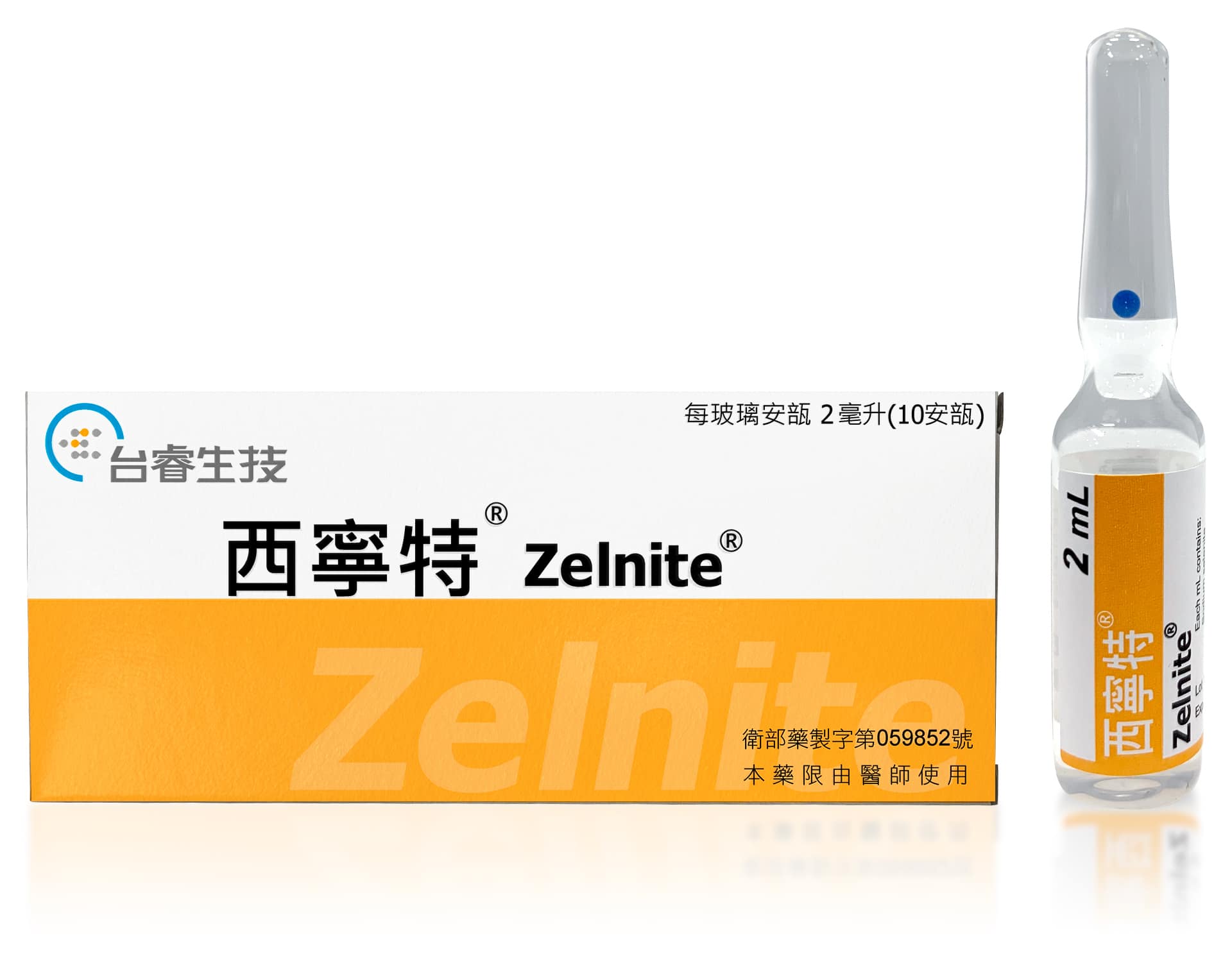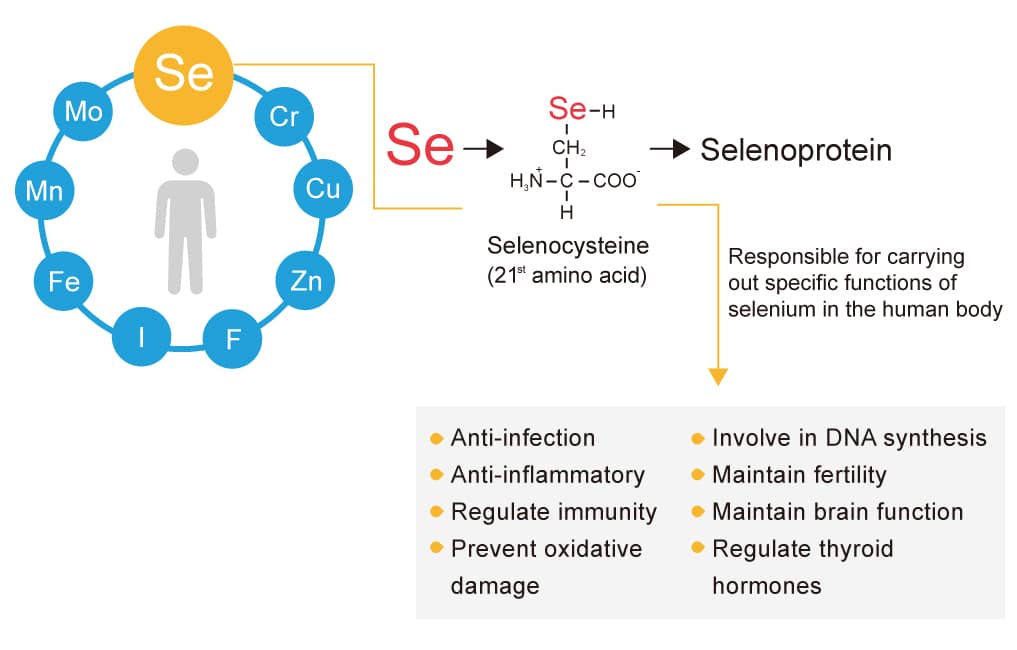Zelnite®
2 ml/ ampoule, 10 ml/ vial

Prescription only (Drug License No. 059852)
Please read the package leaflet carefully before use.
An injection product for treating selenium deficiency or preventing selenium deficiency in patients receiving parenteral nutrition.
- Ingredients:Each milliliter contains:Sodium selenite pentahydrate…166.5 mcg{Equivalent of selenium…50 mcg/ml}
- Daily dosage:The recommended daily dosage for adults is 100 mcg (equivalent to 1 ampoule of Zelnite® 2 mL). 200 mcg selenium (equivalent to 2 ampoules of Zelnite® 2 mL) is recommended for treatment of selenium deficiency. If the results from a blood test show that more selenium is required, the daily dose can be increased up to 500 mcg (equivalent to 1 vial of Zelnite® 10 mL)
- Method of administration:Zelnite® is administered in one single dose by slow intravenous injection; or mixed thoroughly with 100 mL of 0.9% saline solution, followed by intravenous injection. Zelnite® may also be mixed with intravenous nutrition infusions that do not contain vitamin C, then administered after thorough mixing.
- Manufacturing site:Taiwan
- Contraindications:Patients allergic to any ingredients in the product or in selenosis should avoid using the product.
- Package Leaflet (Chinese)
- Innovative synthesis technology and high-grade quality control API analysis technique; Zelnite® can be administered directly, which increases the versatility of the product.
- The advantage of sodium selenite is that it can be absorbed by the body through passive diffusion and be rapidly synthesized into functional selenoproteins. Sodium selenite can be efficiently excreted through urine and aspiration, which prevents unnecessary build-up of excess selenium.
- Sodium selenite injectable is assumed to be 100% bioavailable compared to oral dosage form of selenium. Many international clinical guidelines recommend the supplementation of selenium by intravenous injection route for critically ill patients, and so selenium injection is especially needed for treating selenium deficiency in patients receiving parenteral nutrition and for the critically ill. Because these patients are often unable to eat, Zelnite® in injection form can provide selenium in 100% bioavailability to meet the antioxidant needs of patients and boost immunity. In contrast, oral products may be inadequate in meeting the medical needs of critically ill patients.
Q&A
Trace elements are essential to humans, and these include selenium, iodine, iron, zinc, fluorine, chromium, copper, manganese, and molybdenum. Although trace elements present in humans are miniscule, their biological functions are impactful. Because of this, they are also known as micronutrients. Amongst them, selenium is incorporated into amino acids and make up the 21st amino acid of the human body, and exerts crucial biological functions in the body through the activity of assorted selenoproteins. Humans have around 25 functional proteins/ enzymes that contain selenium, including one of the most important selenoproteins, the glutathione peroxidase (GPx) family proteins, which are associated with anti-oxidant and anti-inflammation, and are involved in the regulation of immunity and other important biological functions. Selenoproteins help keep redox actions in cells balanced, and protects healthy cells from oxidative damage caused by reactive oxygen species (ROS). In addition, selenium plays an essential role as a co-factor, and is closely related to the synthesis of DNA and proteins. Selenium possess multiple functions in the human body.

People who are unable to absorb adequate selenium from food due to insufficient food intake, difficulty eating, critically ill and/or requiring long-term parenteral nutrition (PN) are at risk of selenium deficiency. Deficiency in selenium may in turn worsen existing disease conditions, which may lead to biochemical changes and health risks.
- Patients receiving parenteral nutrition (PN):Selenium deficiency is related to long-term PN that lack selenium, and people with an imbalanced diet. People who are unable to consume food enterally due to influences from diseases or are undergoing therapies, such as cancer patients, need PN to obtain better nutritional status and increase his/her energy level throughout exhaustive therapy sessions. Similarly, people who require temporary fasting or impairment in gastrointestinal functions, may also consider PN to nourish body needs of selenium. Patients who are severely injured (e.g. from burn, or traumatized from car injury), or suffering from acute liver or kidney failure, may also need PN. These patients may result in selenium deficiency due to the inability to consume food or absorb micronutrients through enteral nutrition.
- Critically ill patients who may be exposed to oxidative stress during intensive treatment process and result in deficiency in selenium:Patients with critical illnesses often have increased ROS in the body, such as patients with sepsis, stroke, servere infection, undergoing cardiac surgery, as well as patients with cancer receiving chemotherapy and/or radiotherapy. Compound with stress induced by surgery, chemotherapy/radiotherapy and other high-intensity treatments, selenium deficiency may result.
- Society of Critical Care Medicine (SCCM) and American Society for Parenteral and Enteral Nutrition (ASPEN) recommend routinely add selenium in PN as a single supplement or combined with other micronutrients. Guidelines suggest that patients should be supplemented with 60 to 100 mcg/day of selenium to prevent deficiency, and at least 100 mcg/day to treat selenium deficiency.
- European Society for Clinical Nutrition and Metabolism (ESPEN) and The Australasian Society for Parenteral Nutrition (AuSPEN) both recommend to supplement patients with 60 to 100 mcg/day of selenium during PN.
- According to Martindale (The Complete Drug Reference), selenite and selenate can be used as sources for selenium supplementation, especially with people receiving long-term PN and who are deficient in selenium. For selenium-deficient patients who are unable to make up such deficiency from food, it is recommended to provide 100 to 200 mcg/day of selenium and, if necessary, to increase up to 500 mcg per day.


